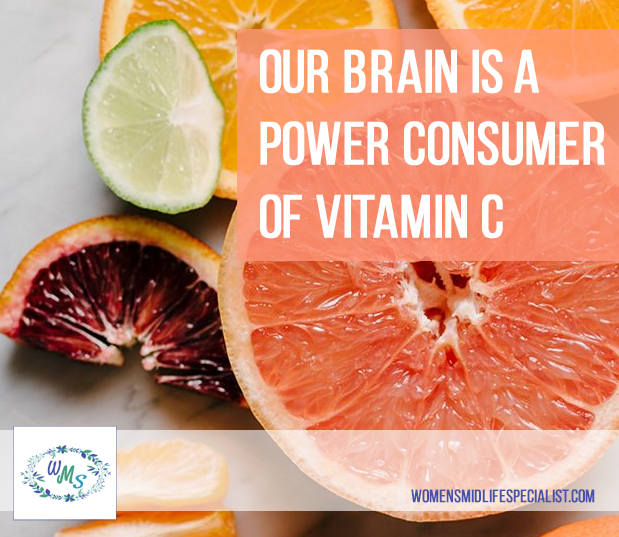Our Brain is a Power Consumer of Vitamin C

More than just "for Colds" ..
Vitamin C, or ascorbic acid, has many different functions in humans and other mammals. In addition to its well known role as an antioxidant, the vitamin serves as a co-factor in several important enzyme reactions, including those involved in the synthesis of catecholamines, carnitine, cholesterol, amino acids, and certain peptide hormones.
Our brain is a power consumer of vitamin C! Brain concentrations of the vitamin are far greater than those in the rest of the body, and long after the body is depleted of the vitamin, the brain maintains its levels.
That's partly because the metabolic furnaces in neurons churn through glucose to power all your thoughts and feelings and movements, and as an antioxidant, the vitamin's job is to surrender electrons to neutralize rogue oxygen molecules given off in the process—free radicals that damage DNA and generally age your cells.
But vitamin C also does more, and some 80 years after its discovery, its additional roles are just coming to light.
Chief among them are actions in the nervous system. Vitamin C plays a role in the differentiation and maturation of neurons and in the formation of the myelin sheath that protects them and speeds impulse transmission, making the vitamin crucial to cognitive performance. It is a cofactor in the synthesis of several neurotransmitters, it's needed to convert dopamine to serotonin, and it modulates neurotransmitter release in nerve cells.
And while it's long been known that the vitamin is a component of collagen, a stabilizing force for teeth, bones, and blood vessels, only now is its role in ensuring blood vessel integrity seen as a factor in cognitive capacity, especially as we age.
An array of studies suggest that, day in, day out over the long haul, vitamin C plays some role in preventing the neural loss that typifies dementia, although studies of the vitamin as a treatment have proved equivocal. Researchers believe that it's long-term vitamin C status that matters, the amount of the antioxidant available over time.
12 Amazing Benefits of Vitamin C
- Papayas and bell peppers are the foods with the highest concentrations of vitamin C.
- Most plants and animals can produce vitamin C, but humans and other primates (along with bats and guinea pigs) cannot make or store it so require it from their diet.
- As a powerful antioxidant, vitamin C helps protect the body from toxins in air pollution and cigarette smoke.
- Smokers need more vitamin C than nonsmokers.
- The collagen tissue supporting teeth and bones is made from vitamin C.
- Vitamin C is a cofactor for at least eight enzymes involved in critical body processes.
- Vitamin C helps boost heme iron absorption from the gastrointestinal tract.
- Vitamin C is vital to the biosynthesis of carnitine, a major regulator of energy production from fat.
- Regular intake of vitamin C attenuates colds, shortening their duration and severity.
- High levels of vitamin C intake are linked to a lessened chance of developing eye cataracts and macular degeneration.
- Delayed wound healing may be a sign of vitamin C deficiency.
- Vitamin C is delicate and can be destroyed in the high temperatures generated by broiling, grilling, and frying foods.


Leave a comment